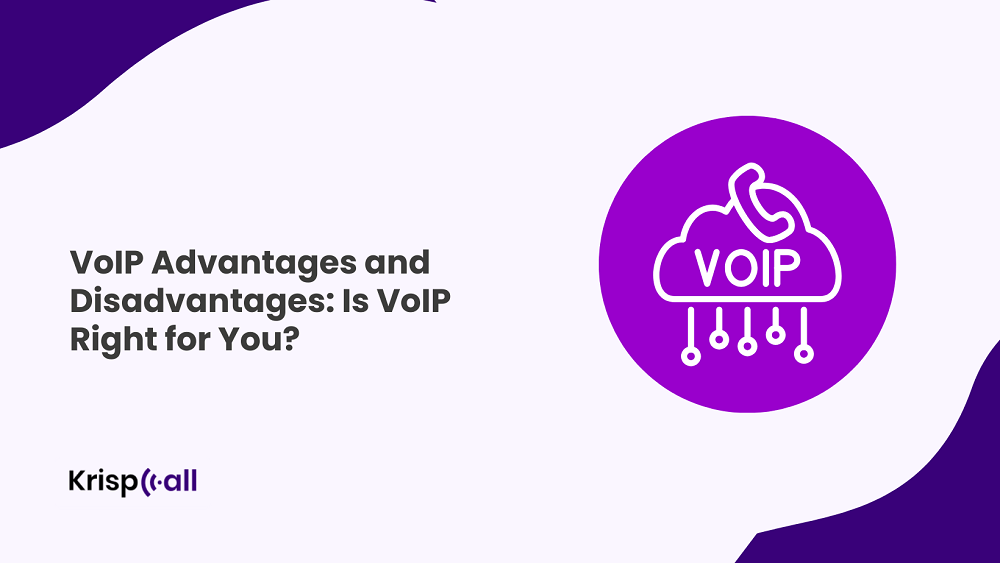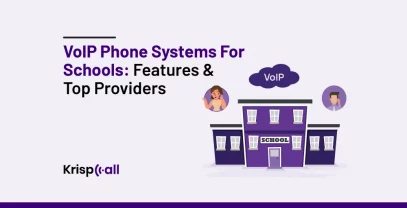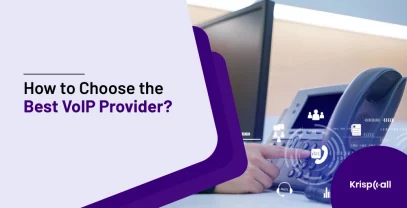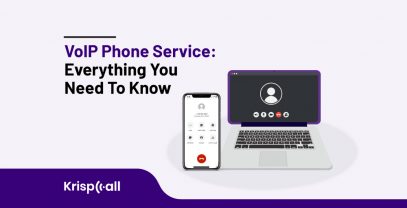Are you unsure if VoIP is right for your business telecommunication needs? Explore the latest pros and cons of VoIP to make your decision based on your specific needs. Find out how VoIP can improve efficiency and maximize your business operations.
Take a closer look at our comparison guide to see if VoIP is a fit for your business
Let’s Get Started 👇
What is VoIP?
VoIP referred to as Voice over Internet Protocol is a technology that lets you use your internet connection to make voice calls instead of a regular phone line. Traditional phone uses analog data while VoIP converts your voice into digital signals that are transferred to the recipient via the internet.
It is a cost-effective and efficient means to connect particularly for corporations because it includes capabilities such as video conferencing, call forwarding, and voicemail to email. A VoIP phone can also be a softphone or software application installed on a computer offered by vendors like KrispCall, RingCentral, Skype, and GoogleVoice.
Furthermore, it consolidates communications technologies into one system supporting audio, video, and text-based communication methods. This is particularly useful for businesses so teams don’t have to use multiple applications to communicate effectively
Benefits of VoIP: 8 Advantages for Businesses
Businesses can enhance their communication strategy and simplify operations via VoIP technology. Here are some benefits of VoIP for businesses
1. Cost Savings
Businesses can avoid the significant upfront costs💰 involved in buying and maintaining on-premises gear by utilizing cloud-based solutions. Businesses can optimize resource allocation and cost-effectiveness by adjusting their communication infrastructure to their needs by utilizing the scalability and flexibility of cloud-based technologies.
2. Scalability
As businesses grow or contract, VoIP systems can effortlessly adjust to meet changing needs by delivering a scalable solution that develops alongside the enterprise. This scalability enables enterprises to scale their communication capabilities efficiently and cost-effectively, hence facilitating their growth and evolution in changing market contexts.
3. Flexibility and Mobility
VoIP enables you to access your phone system from anywhere with an internet connection. So, whether you’re working from home 🏠, traveling ✈️ or at a coffee shop, you can easily stay connected and handle business calls. This flexibility allows you to work wherever you are most comfortable and productive, without compromising your ability to communicate effectively.
4. Feature-rich Options
Feature-rich Options 🛠️ suggest that VoIP provides an endless number of cool features to employ during calls. It’s like having a large toolbox filled with communication instruments. You can do more than simply talk; you can route calls, leave voicemails, hold group meetings, and even make video conversations. It’s like having a phone system that can do practically anything you ask!
5. Integration with Other Systems
Integration with other systems suggests that VoIP can simply connect to and interact with other tools and software that a company uses. For example, it can connect to customer databases or email systems. This ensures that all communication technologies are integrated and work well together.
6. Enhanced Collaboration
People can collaborate more effectively with VoIP. Teams can use VoIP to communicate with one another from various locations via the Internet. They may collaborate to share ideas, ask questions, and solve problems, even if they are not in the same room. This makes it easy for everyone to collaborate as a team and complete tasks faster and more effectively.
7. Eliminating Wiring Charges
One advantage of VoIP for businesses is that it eliminates wiring expenditures. You know those unpleasant costs you have to pay for installing and maintaining all those phone lines?
You no longer need such connections with VoIP because everything is transmitted via the internet. Businesses can save money 🔌💰 by not having to pay extra for wiring. It’s like eliminating a monthly bill and keeping more money in your pocket!
8. Supports Multitasking
VoIP supports multitasking, which means you can use the phone to perform multiple things at the same time. For example, you can make a VoIP call while still sending an email or working on a document. This allows organizations to be more productive and efficient because staff can perform various jobs without having to stop chatting on the phone.
Drawbacks of VoIP: 6 Disadvantages for Businesses
While VoIP has advantages, it is also important to understand its disadvantages which are :
1. Dependence on Internet Connectivity
One disadvantage of VoIP for organizations is that it depends on Internet connectivity. VoIP uses internet connections 📶 to make and receive conversations, so any disruptions or weak internet speeds can degrade call quality or even cause calls to drop.
This implies that if your internet goes down, you may be unable to utilize your VoIP phone system until it returns to normal operation. So, while VoIP has numerous advantages, it’s critical to have a stable internet connection to avoid communication issues.
2. Call Quality Concerns
When you utilize VoIP (Voice over Internet Protocol) for phone calls, the quality may not always be satisfactory. This could happen if your internet connection is slow or there is a network issue.
It may cause speech to seem fuzzy or cut out at times⚠️📞, making it difficult to comprehend the person you are speaking with. So, while VoIP is fantastic for saving money and being flexible, call quality can occasionally be an issue.
3. Security Risks
One of the disadvantages of VoIP is the possible risks to safety it can present to enterprises. Because VoIP calls travel over the internet, they are susceptible 🔒🚫 to a variety of security risks such as hacking, eavesdropping, and data breaches.
Without adequate security measures in place, sensitive information transferred during VoIP calls may be intercepted or compromised.
4. Emergency Service Limitations
When a VoIP user attempts to call emergency services such as 911, cannot be called. 🆘📞This can be problematic since in an emergency, every second counts, and waiting for aid might be dangerous.
5. Latency and Jitter
Latency and jitter occur when data packets are either delayed in transmission or incorrectly reassembled. These difficulties may not even be related to your network; large internet backbones adjust data pathways to ensure that traffic is delivered consistently and on the shortest path to a destination.
6. The complexity of Configuration and Management
The complexity of Configuration and Management is one of the drawbacks of VoIP. It means that setting up and managing VoIP systems can be a bit tricky and complicated. Here’s why:
- Setting up VoIP phones and systems requires technical knowledge, which might be challenging for some people.
- Managing VoIP systems involves dealing with various settings and configurations, which can be confusing.
- Troubleshooting issues with VoIP, like poor call quality or dropped calls, can be complex and may require expertise.
- Overall, while VoIP offers many benefits, managing and configuring it can be a bit tough.
VoIP Vs Traditional Phone System: Why Switch To VoIP?
When comparing VoIP (Voice over Internet Protocol) to traditional landline phone systems, the advantages of VoIP become clear.
Moving from traditional phone lines to VoIP is of the utmost importance due to its features and being available anywhere simply with access of an internet connection. To begin, VoIP stands out for its capacity to significantly lower communication costs through lower monthly fees and affordable international calling rates.
VoIP offers a wide range of features such as call forwarding, voicemail-to-email transcription, and smooth connection with other company applications, increasing productivity and efficiency. Its scalability is also remarkable as it allows organizations to simply adjust their phone systems to handle growth and demand fluctuations.
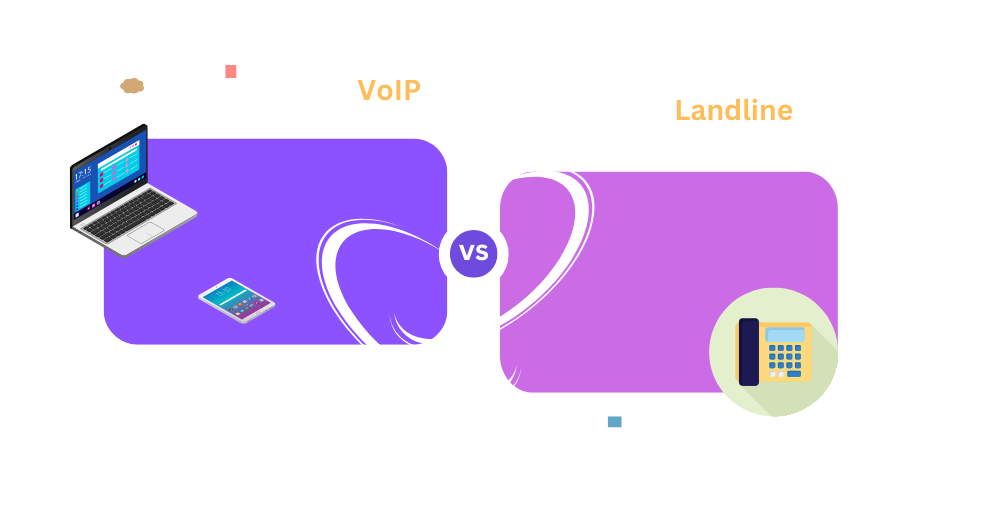
Switching from traditional landline phone systems to VoIP is becoming more important due to various compelling reasons and significant differences between the two technologies. For starters, VoIP can often be less expensive than traditional landlines.
VoIP often provides lower monthly fees and lower international calling rates, making it a financially advantageous option for both enterprises and individuals.
Furthermore, it offers increased freedom and mobility. Unlike traditional landlines, which are limited to actual phone lines and locations, VoIP enables users to make and receive calls from anywhere with an internet connection. This flexibility is particularly useful for remote work, travel, and businesses with different locations.
How to Choose a VoIP Provider For Your Business: Things to Consider
Choosing the right VoIP for your business maximizes business operations such that VoIP is reliable for you. You need to consider important things before you initiate which are mentioned below:
- Find your requirements: Determine what kind of phone system you require for your business communication. When you prefer VoIP phone systems you need to consider Some of the common types of VoIP systems Such as hosted PBX, cloud-based, and unified communication
- Call Quality: Consider the provider’s reputation for delivering clear and consistent voice calls without interruptions or delays. Look for reviews or testimonials from other users to gauge the quality of their service.
- Features: Determine which features are essential for your business needs and ensure that the provider offers them.
- Cost: Compare the pricing plans of different providers to find one that fits within your budget. Take into account factors such as monthly fees, setup costs, and any additional charges for extra features or usage.
- Customer Support: Look for 24/7 phone support, online chat, and comprehensive help resources like knowledge bases or tutorials.
- Ease of Use: Look for intuitive design, simple setup processes, and user-friendly features that make it easy for you and your team to manage calls and settings.
5 Best VoIP Providers in 2024 For Business Telephony
There are lots of VoIP platforms available to businesses in the present day. Here is the list of five leading VoIP providers currently.
1. KrispCall
A virtual cloud phone system KrispCall Is a reliable telephone service for modern businesses as it provides virtual phone numbers for business. It is well known as an all-in-one platform because it offers multiple features that make it easier and more convenient to connect with your team and customers from anywhere around the world.
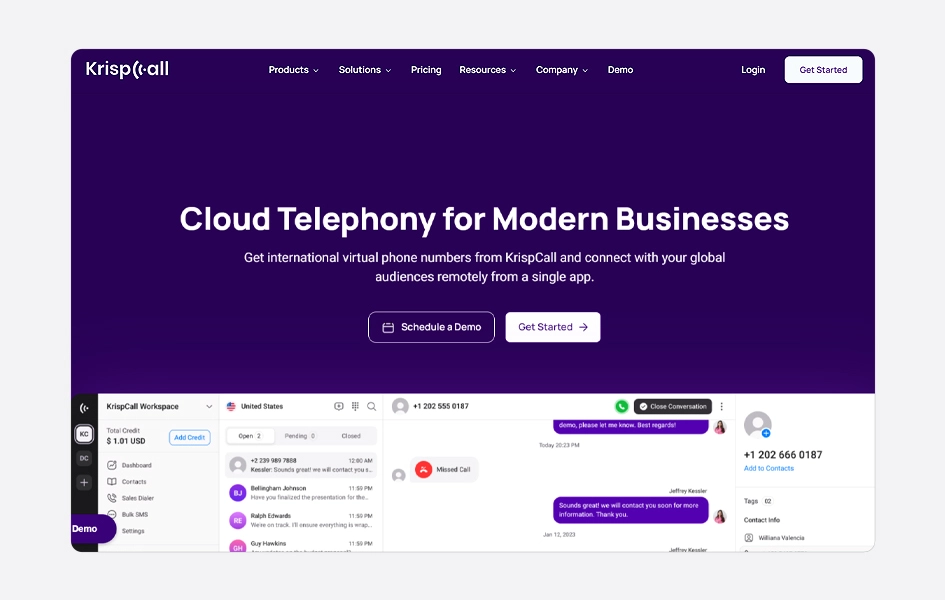
When you incorporate KrispCall Into your business you can get the toll-free number local number and national phone numbers instantly at an affordable. KrispCall provides enterprise great capabilities on and accessible to any device such that you can optimize phone operations for maximum productivity.
KrispCall Features
- Unified Callbox: It brings all telephonic conversations together and lets you stay up-to-date on whether each conversation either is true or call SMS or voicemail
- Global Calling: You can expand your reach abroad with crystal-clear voice calls
- Call Analytics: You can receive insightful analytics to measure agents’ performance
- Shared Phone Number: With this feature, you can share your phone numbers to multiply your availability.
- Call Transfer: Effortlessly transfer your active calls to the expert agents.
KrispCall: Pricing💲
| Plans | Pricing/month |
| Essential | $15/user |
| Standard | $40/user |
| Enterprise | custom` |
👉Try KrispCall Now: 📅 Book a Free Demo
2. Dialpad
Dialpad is the leading Customer Intelligence Platform, transforming the way businesses communicate with their customers. Dialpad connects teams, allowing them to form stronger relationships and drive considerable Return on Investment (ROI). Dialpad enables enterprises to thrive in the digital age by ensuring that every interaction matters.
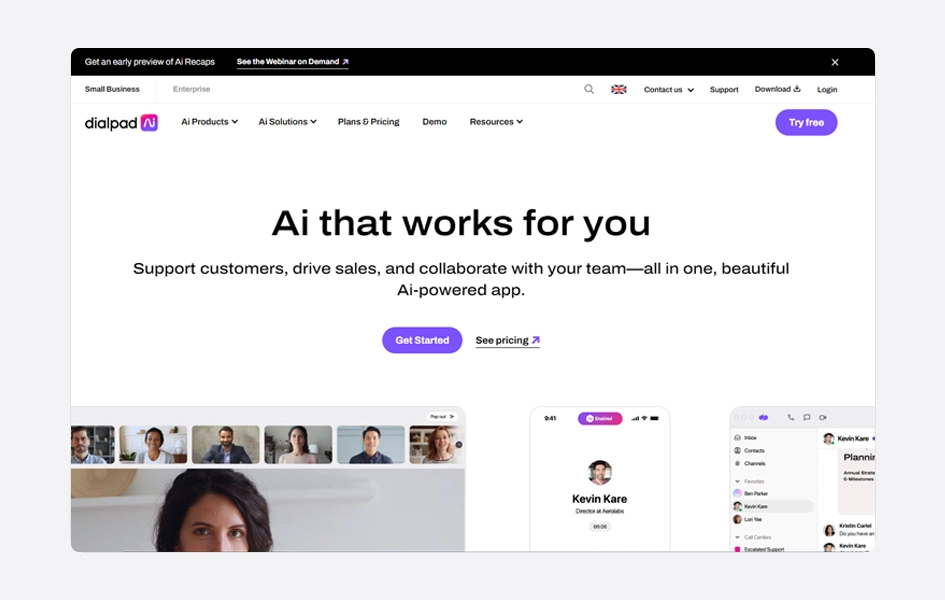
Dialpad: Features
- Voicemail: It features voicemail with accurate transcriptions and custom greetings
- Business phone app: A business phone app that works across iOS, Android, PC, and Mac
- Porting numbers: Keep your phone numbers even when you switch to Dialpad
- Visual voicemail: Save time with voicemails transcribed with Dialpad Ai
- Caller ID: Custom caller ID protects your number on your cell phone
Dialpad Pricing💲
| Plans | Pricing/month |
| Standard | $15 user |
| Pro | $25 user |
3. 8X8
8×8 helps you create personalized solutions designed for your business needs. Whether it’s improving customer experiences or initiating better strategies for your businesses, its integrations utilize important data to blend into their platform.
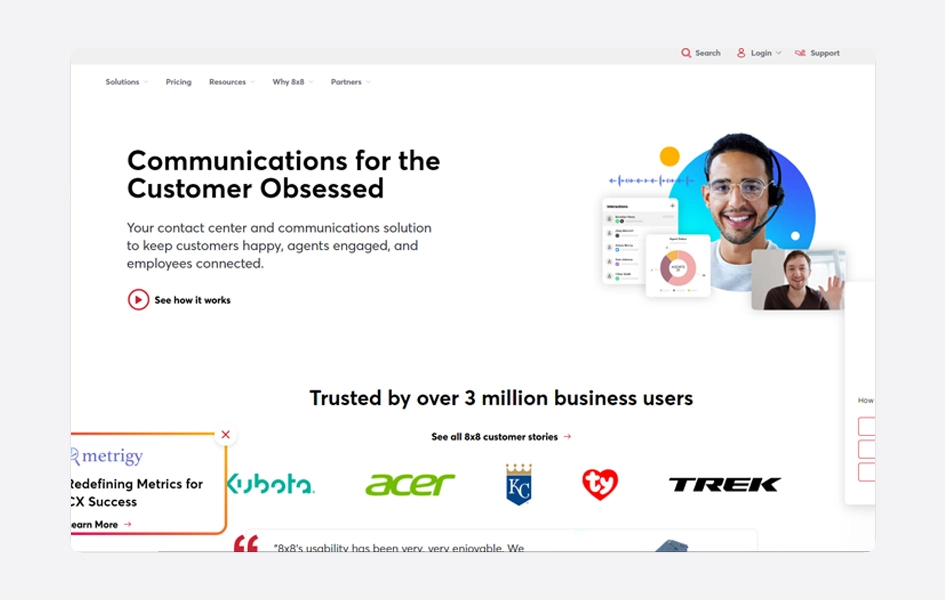
It is a communication platform. The 8×8 unified platform is for contact centers, business phones, video, chat, and APIs helping companies of any size deliver differentiated customer experiences.
8×8 : Features
- Business Phone – Give your business a better advantage with the cloud-based phone system.
- Video Conferencing – allows video conferencing on any device for many participants
- Team Chat – With this feature you can easily access your conversations with your contacts
- Devices & Accessories – Provide all the VoIP phones, headsets, and accessories your business needs for communications.
8*8 : Pricing💲
| Plans | Pricing/month |
|---|---|
| Express | $15 per user |
| X2 | $24 per user |
| X4 | $44 per user |
| X6 | $85 per user |
| X7 | $110 per user |
| X8 | $140 per user |
4. RingCentral
One of America’s leading innovators, RingCentral, Inc. is well-known for offering state-of-the-art cloud-based communication and collaboration solutions and services.
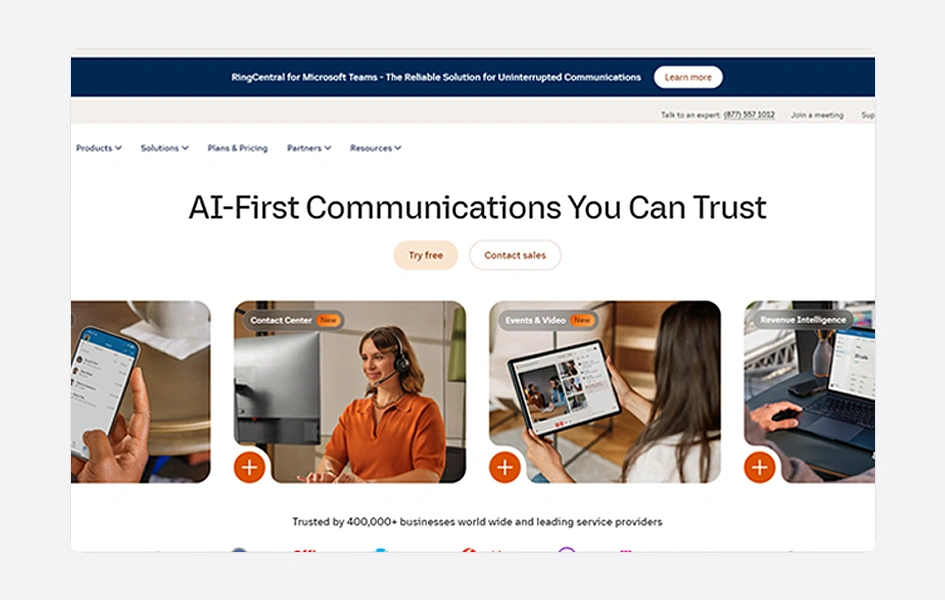
RingCentral Features
- Automatic call recording
- Video conferencing
- Instant messaging
- Visual voicemail
- Call from computer softphone
RingCentral Pricing💲
| Plans | Pricing/month |
| Essential | $20 per user per month |
| Standard | $25 per user per month |
| Premium | $35 per user per month |
| Ultimate | $33.99 per user per month |
5. Nextiva
A leading voice-over-internet-protocol (VoIP) company, Nextiva specializes in providing cutting-edge cloud-based communication solutions in Scottsdale, Arizona. By offering comprehensive telephone and technology solutions. Nextiva offers a comprehensive range of business communication services to meet the needs of more than 150,000 businesses.
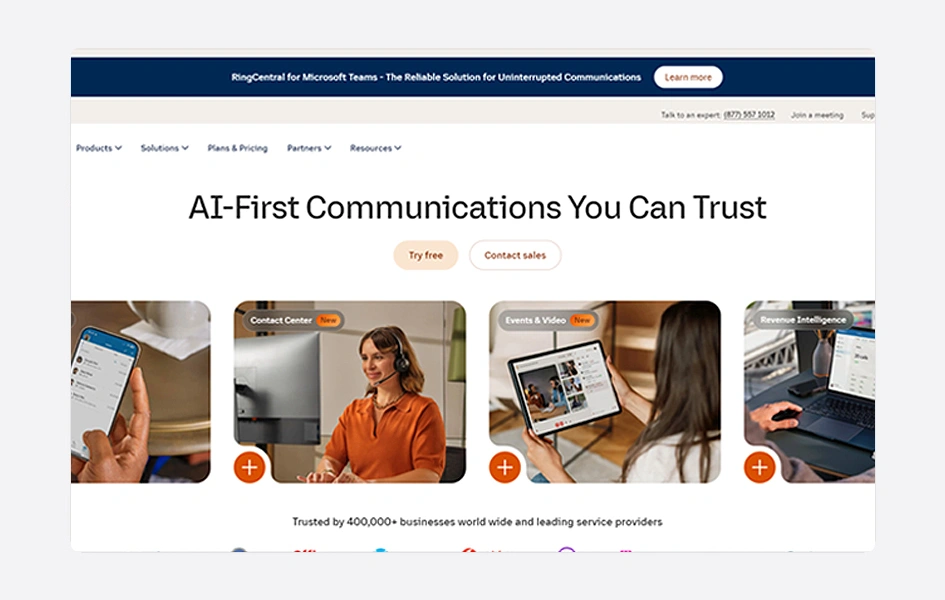
Nextiva: Features
- HD VoIP Phone Service: Nextiva offers a high-definition VoIP phone service designed for businesses.
- NextivaONE App: The NextivaONE App reinforces the significance of how each relationship is a priority to your business, even while on the go.
- Unlimited Calling in North America: make staying in touch with customers a high priority to earn their trust.
- Unlimited Business Text Messaging: you can manage your teams and employees to prevent interruptions
- Unlimited Online Faxing: you can send faxes via the vFAX Portal
- Unlimited Web Conferencing: It works to enhance meetings by offering distinctive and advanced tools and solutions.
Nextiva: pricing
| Plans | Pricing/month |
| Essential | $18.95 |
| Professional | $22.95 |
| Enterprise | $32.95 |
Top VoIP Providers For Business Telephony Compared
| Service Providers | Pricing/month | Top Features | Best For | User experience |
| KrispCall | Essential: $15/userStandard: $40/userEnterprise:customized solution | Global Calling, Unified Call Box, Virtual Phone Number | International Business Calling,Local phone numbers, crystal clear call quality | Ese to set up, user-friendly and 24-hour customer service available |
| Dialpad | Standard:$15 user Pro: $25 user | Voicemail, porting numbers, Caller ID | local presence | hard to tell when new text messages come in and there’s no way to filter/sort/search efficiently. |
| 8*8 | Express: $15 per userX2: $24 per userX4: $44 per userX6: $85 per userX7: $110 per userX8: $140 per user | Video conferencing, team chat, business phone | Business calling | User-friendly and easy to set up |
| RingCentral | Essential:$20 per user Standard: $25 per user Premium: $35 per user Ultimate: $33.99 per user | Automatic call recording.Call Flip | Communication service | Easy-to-use phone service with untold features. Flexible to understand and to teach new employees. |
| Nextiva | Essential:$18.95Professional:$22.95Enterprise:$32.95 | HD VoIP Phone Service, NextivaONE App | streamlines business communications | Easy to set up and 24 hour customer support available |
Conclusion
VoIP (Voice Over Internet Protocol) communication processes, enhanced flexibility, and reduced costs for businesses. These systems include advanced features like voicemail-to-email transcription, call routing, and forwarding, auto-attendants, and video conferencing. These advantages empower enterprises.
VoIP is a popular choice among businesses because of its advanced features, scalability, flexibility, affordability, and capacity to improve customer service and efficiency by improving communication procedures. Traditional landline phones, on the other hand, carry analog speech signals using physical copper lines or fiber-optic cables, which limits their mobility and flexibility.
While choosing the best VoIP provider, KrispCall can be your best choice as it is one of the best VoIP service providers with multiple features and capabilities that can maximize your business productivity. It is budget-friendly and easy to use for every kind of user.
You can learn more about this by using our comparison tables above to compare rates and user experience across providers like KrispCall, Dialpad, 8*8, RingCentral, and Nextiva. Also, more to see who meets your needs at a high level.

